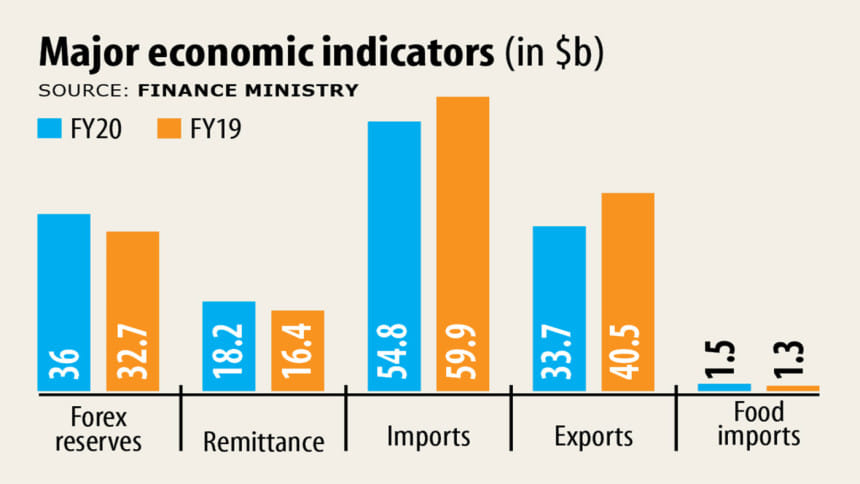Revenue collection, exports disappoint while reserves, remittance shine last fiscal year

Record remittance earnings and foreign currency reserves are among a few positive takeaways for the government in an otherwise painful fiscal year as the devastating coronavirus pandemic pushed revenue collection to an unprecedented fall and exports to collapse.
Bangladesh's tax collection dropped as much as 25.4 per cent year-on-year to Tk 168,677 crore in the just-concluded fiscal year as the coronavirus pandemic brought the economy to a standstill.
Non-tax revenue, however, rose 21.8 per cent to Tk 31,571 crore, according to the annual report on government activities for fiscal 2019-20.
Overall, revenue collection dipped 20.5 per cent to Tk 200,248 crore. This is first-ever negative growth in Bangladesh's history.
The two-and-half-month-long countrywide general shutdown introduced on 26 March dented the state's coffer as economic activities saw massive disruption in the last quarter of the fiscal year ending in June.
Foreign currency reserves grew 10.2 per cent year-on-year to $36 billion in fiscal 2019-20, which was $32.7 billion a year earlier, on the back of a higher-than-expected remittance flow, a fall in imports and budget support from the development lenders.
Money sent home by Bangladesh's more than 1 crore migrant workers stood at $18.2 billion, up 10.9 per cent year-on-year.
In the just-concluded fiscal year, Bangladesh received $500 million from the Asian Development Bank, $250 million each from the World Bank and the Asian Infrastructure Investment Bank and $732 million from the International Monetary Fund to help the people and pull the economy out of the crisis.
Imports fell 8.6 per cent year-on-year to $54.8 billion, as demand dropped drastically in the country after the deadly virus arrived at the shores of Bangladesh in March.
Similarly, exports plummeted 16.9 per cent to $33.7 billion as Western countries were devastated by the pestilence.
Opening of letters of credit for importing rice and wheat increased 15.3 per cent to $1.5 billion, which was $1.3 billion a year earlier.
The stock of food grains fell 29 per cent to 11.9 lakh tonnes, which was 16.7 lakh tonnes in fiscal 2018-19. This is because of the distribution of grains as relief among the people suddenly rendered jobless and poor by the pandemic.
More than 80.2 crore individuals, families and organisations received a combined Tk 74,367 crore in social safety net allowances last fiscal year, up from 76.3 lakh beneficiaries involving Tk 64,177 crore a year earlier.
The government has rolled out online salary bill submission across the country and more than 1.5 lakh officers are submitting salary bills electronically at the moment.
The government is set to get rid of paper-based salary bill submission from this fiscal year, the finance ministry report said.
All ministries and divisions and head offices of most of the departments have introduced online salary bill submission and disbursement of salaries through the electronic fund transfer (EFT) for non-gazetted officials. The scheme would be expanded all over the country in the current fiscal year.
The government has formulated a pension database of pensioners and information about 8.2 lakh of them are now included in it. The pensioners receive monthly payment through the EFT.
The government has set up the central pension providing office. All pensioners would come under the EFT system this fiscal year.
Besides, an online database of about 11.5 lakh government employees has been established.
The government is providing allowances to more than 50 lakh people through EFT under its various social safety net programmes. It is now working to pay out the allowances directly using the Integration Budget and Accounting System.

 For all latest news, follow The Daily Star's Google News channel.
For all latest news, follow The Daily Star's Google News channel. 



Comments